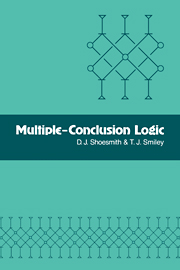
-
Select format
-
- Publisher:
- Cambridge University Press
- Publication date:
- 06 July 2010
- 06 July 1978
- ISBN:
- 9780511565687
- 9780521093323
- Dimensions:
- Weight & Pages:
- Dimensions:
- (228 x 152 mm)
- Weight & Pages:
- 0.6kg, 416 Pages
You may already have access via personal or institutional login
Book description
Multiple-conclusion logic extends formal logic by allowing arguments to have a set of conclusions instead of a single one, the truth lying somewhere among the conclusions if all the premises are true. The extension opens up interesting possibilities based on the symmetry between premises and conclusions, and can also be used to throw fresh light on the conventional logic and its limitations. This is a sustained study of the subject and is certain to stimulate further research. Part I reworks the fundamental ideas of logic to take account of multiple conclusions, and investigates the connections between multiple - and single - conclusion calculi. Part II draws on graph theory to discuss the form and validity of arguments independently of particular logical systems. Part III contrasts the multiple - and the single - conclusion treatment of one and the same subject, using many-valued logic as the example; and Part IV shows how the methods of 'natural deduction' can be matched by direct proofs using multiple conclusions.
Contents
Metrics
Full text views
Full text views help Loading metrics...
Loading metrics...
* Views captured on Cambridge Core between #date#. This data will be updated every 24 hours.
Usage data cannot currently be displayed.
Accessibility standard: Unknown
Why this information is here
This section outlines the accessibility features of this content - including support for screen readers, full keyboard navigation and high-contrast display options. This may not be relevant for you.
Accessibility Information
Accessibility compliance for the PDF of this book is currently unknown and may be updated in the future.


